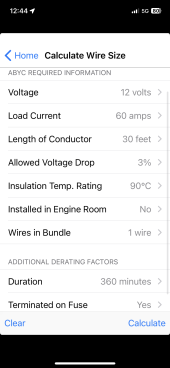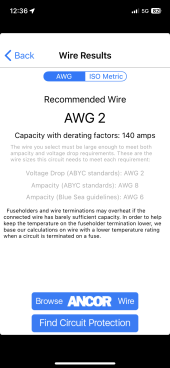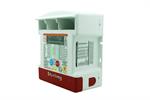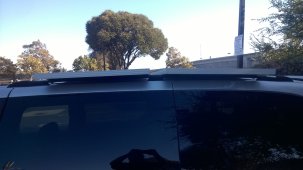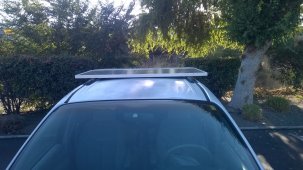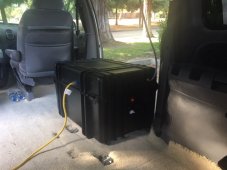Hi,
I'm looking to build a system this week, but I'm torn between a 400ah 12v or 200ah 24v battery.
Because of the holiday, a few companies have a sale ending tonight, so I feel like I need to purchase today.
I did a small 12v lead acid build a few years ago (batteries dead) so I should have most of the wires I'll need (at least I think). A fair amount of 2ga wire and some 10 and 14awg. I also have a fuse block and kill switch from that build I'd like to use. I have an older 12v, 750 inverter but it's not pure sine wave so I'll upgrade that this week anyways (a 2000w invertor should be plenty for me at time).
I have a 100w Renogy foldable solar panel and plan on adding about 400w of additional panels (those will likely be foldable as well). Because all the panels are foldable, they won't be permanently attached to the outside of the van, instead I'll take them out when parked and I'm able to.
In addition to the 100-500w of solar I'd like to use a dc-dc charger to get power from the car while driving.
The best dc-dc charger I found for a 12v system was the Renogy 60a. For 24v the best I saw was a 15a with Bluetooth. I like that the 12v, 60a will charge twice as fast as a 24v, 15a and I don't really want Bluetooth, so because of all that I like the 12v option.
If I can get on average of 6 hours of good sun with 500w of solar that should give me enough to power all of my needs. On days when I can't get solar, the 12v, 60a dc-dc charger driving for 6 hours would be enough. The 24v, 15a dc-dc charger would be ok but about half my needs.
Here is my anticipated power usage:
Working on my computer for up to 10 hours a day (an 85watt laptop, I believe) - 850 watts
A small Dometic 12v fridge (CoolFreeze cf-25, 35 watts) - 840 watts
A 120v slow cooker for 7 hours every three or four days (says 250 watts on plug, it's a 6-quart Hamilton Beach) - 1750 watts
Enough lights for about 75 square feet, powering smaller portable batteries/phone, other misc. - 1,000 watts (a guess)
At some point I would like to add a large chest freezer from sunstar (says when room temp is 90F (32.2C) it uses 495 WHR but I'm not sure what whr means)
If possible, it'd be awesome to run a 120v electric, 530watt appliance for 6 hours a day (trying to be realistic so this may not work) - 3,180 watts
Another if possible, it would be awesome to be able to use a 120v air fryer two to three times a week for 45 minutes at a time using 1200-1500w.
Maybe at some point in the future some sort of smaller AC unit but no plans for that at the moment.
I keep hearing that 24v is better. However, in my situation since it's a relatively smaller system and I'd like to charge via dc-dc, I'm wondering if the benefits of a 24v system still make it worth wile? For example, I hear 24v is more efficient, does that mean the 500w of solar I have will charge the bank faster? Does it also mean that I'll use less power overall on my daily loads on a 24v system? I also hear with a 24v system you save money on wires, since I already have large 2ga wire, should I just go with the 12v?
Any help choosing a 400ah 12v system or 200ah 24v system would be appreciated!
I'm looking to build a system this week, but I'm torn between a 400ah 12v or 200ah 24v battery.
Because of the holiday, a few companies have a sale ending tonight, so I feel like I need to purchase today.
I did a small 12v lead acid build a few years ago (batteries dead) so I should have most of the wires I'll need (at least I think). A fair amount of 2ga wire and some 10 and 14awg. I also have a fuse block and kill switch from that build I'd like to use. I have an older 12v, 750 inverter but it's not pure sine wave so I'll upgrade that this week anyways (a 2000w invertor should be plenty for me at time).
I have a 100w Renogy foldable solar panel and plan on adding about 400w of additional panels (those will likely be foldable as well). Because all the panels are foldable, they won't be permanently attached to the outside of the van, instead I'll take them out when parked and I'm able to.
In addition to the 100-500w of solar I'd like to use a dc-dc charger to get power from the car while driving.
The best dc-dc charger I found for a 12v system was the Renogy 60a. For 24v the best I saw was a 15a with Bluetooth. I like that the 12v, 60a will charge twice as fast as a 24v, 15a and I don't really want Bluetooth, so because of all that I like the 12v option.
If I can get on average of 6 hours of good sun with 500w of solar that should give me enough to power all of my needs. On days when I can't get solar, the 12v, 60a dc-dc charger driving for 6 hours would be enough. The 24v, 15a dc-dc charger would be ok but about half my needs.
Here is my anticipated power usage:
Working on my computer for up to 10 hours a day (an 85watt laptop, I believe) - 850 watts
A small Dometic 12v fridge (CoolFreeze cf-25, 35 watts) - 840 watts
A 120v slow cooker for 7 hours every three or four days (says 250 watts on plug, it's a 6-quart Hamilton Beach) - 1750 watts
Enough lights for about 75 square feet, powering smaller portable batteries/phone, other misc. - 1,000 watts (a guess)
At some point I would like to add a large chest freezer from sunstar (says when room temp is 90F (32.2C) it uses 495 WHR but I'm not sure what whr means)
If possible, it'd be awesome to run a 120v electric, 530watt appliance for 6 hours a day (trying to be realistic so this may not work) - 3,180 watts
Another if possible, it would be awesome to be able to use a 120v air fryer two to three times a week for 45 minutes at a time using 1200-1500w.
Maybe at some point in the future some sort of smaller AC unit but no plans for that at the moment.
I keep hearing that 24v is better. However, in my situation since it's a relatively smaller system and I'd like to charge via dc-dc, I'm wondering if the benefits of a 24v system still make it worth wile? For example, I hear 24v is more efficient, does that mean the 500w of solar I have will charge the bank faster? Does it also mean that I'll use less power overall on my daily loads on a 24v system? I also hear with a 24v system you save money on wires, since I already have large 2ga wire, should I just go with the 12v?
Any help choosing a 400ah 12v system or 200ah 24v system would be appreciated!



